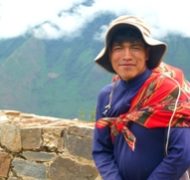Juancito’s Gift
Blog / Produced by The High Calling
I’ve eaten campfire-baked pepperoni rolls, trail mix with marshmallows, cajun Spam melts, and powdered milk “tea” with vanilla and cinnamon, all in the outdoors. But I had never dined in the wilderness until Peru.
A week of four-course meals with garnished plates on a traditional Peruvian tablecloth set for 16 alongside a mountain path at 10,000 feet above sea level?
This is the work of Juancito.
During a recent three-week excursion to Peru with college students, Juancito represented one of several memorable individuals we met who defined the country as hospitable. Ironically, we paid these individuals, including Juancito, to host us. Yet for a reason I'd like to tell you about, having paid them does not detract from my opinion that Peru is hospitable.
The reason has to do with gift exchange.
Increase
In The Gift: Creativity and the Artist in the Modern World, Lewis Hyde states that “…when you give a gift there is momentum." This he calls the increase. “The increase is the core of the gift, the kernel…. n gift exchange it, the increase, stays in motion and follows the object, while in commodity exchange it stays behind as profit.”
What does this mean? On a simple economic level, a commodity exchange took place between Juancito (his boss, actually) and our group. We paid him; he cooked. End of story.
On a richer level, however, he did more than cook and we did more than hand him money. There was increase. Jauncito got up earlier, hiked faster, worked longer hours and went to bed later. And we noticed.
One late night, exhausted and stumbling along a dark path to brush my teeth, I discovered Juancito kneeling beneath a mountain spigot with a large sack open at his side. He was washing our dishes. Pots, pans, ladles, plates, silverware, pitchers. I caught myself staring for a moment, unable to miss that he was doing something I could not.
“In folk tales the gift is often something seemingly worthless – ashes or coals or leaves or straw – but when the puzzled recipient carries it to his doorstep, he finds it has turned to gold. Such tales declare that the motion of the gift from the world of the donor to the doorsill of the recipient is sufficient to transmute it from dross to gold.”
As the week went on, the gold emerged as we affirmed Juancito in more direct ways. Though our hesitant North American taste buds pushed away the stranger dishes, he knew we tried and his smile, his own gold, grew. By the end, Jauncito's name entered nearly every conversation and we expressed affirmingly and repeatedly, “Can we please take you home with us?” He was no longer simply our cook. The students' attention and respect flattered him immensely and on the eve of the last day – in his quiet, subservient way, knowing the 5:00 a.m. alarm for another day of rigorous hiking would come too soon – he labored past midnight to bake us a cake.
“Pharaoh himself was dead long before his firstborn was taken, for we are only alive to the degree that we can let ourselves be moved. And when the gift circles into mystery the liveliness stays, for it is ‘a pleasing odor to the Lord’ when the first fruits are effused in eddies and drifted in lacy jags above the flame.”
There is the exchange of goods and services, and then there is the increase. As Jesus liked to say in so many analogous ways, the latter is what characterizes the Kingdom.
Image and post by Sam Van Eman. Quotes by Lewis Hyde.





